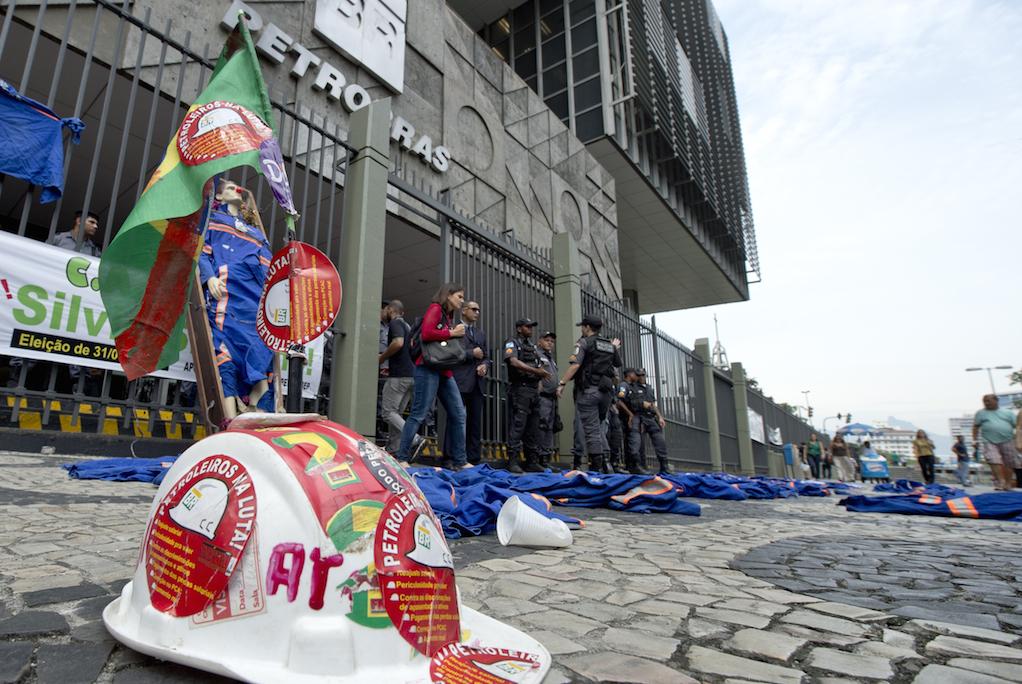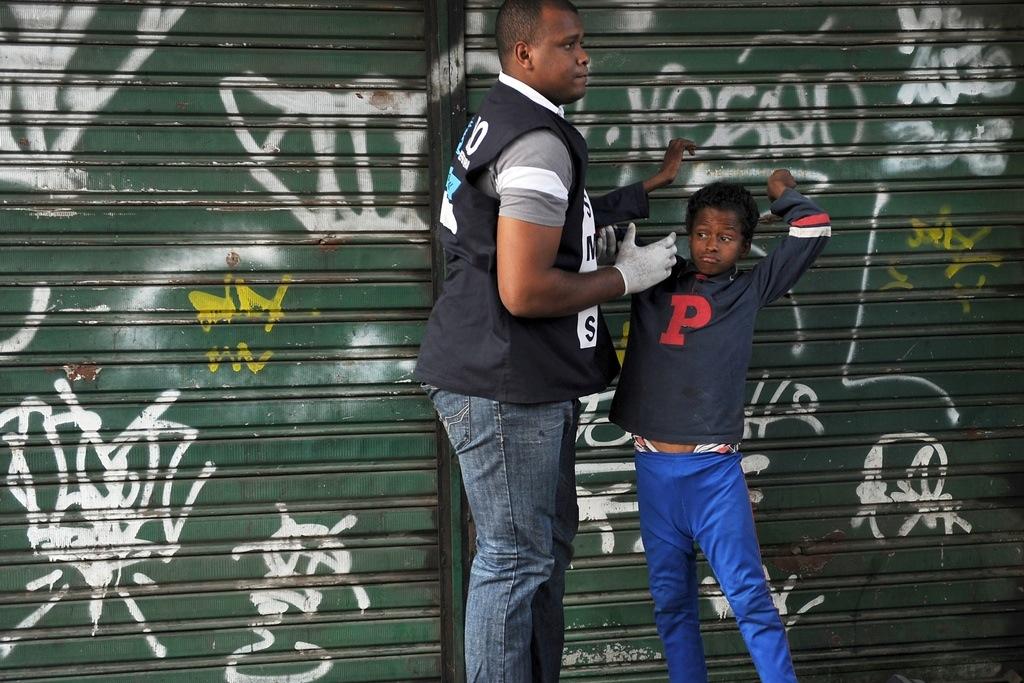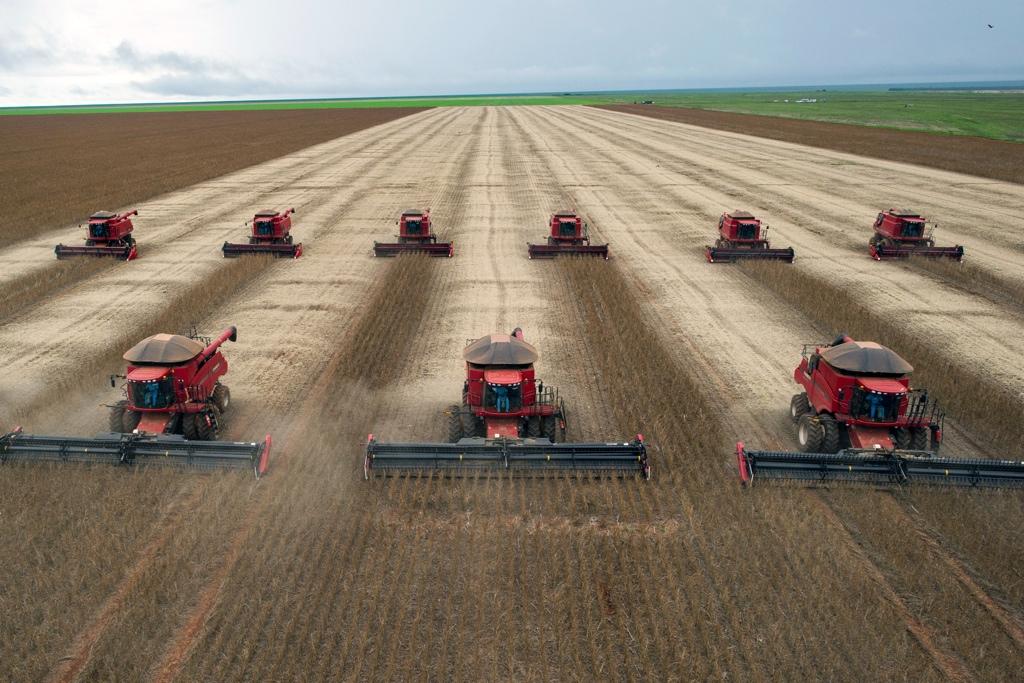Brazil defies (positive) expectations
A street scene in Rio de Janeiro is pictured.
It wasn’t so long ago that Brazil was hailed as one of the world’s great up-and-coming economic powers. Now, emerging from its worst recession in a century, which has shrunk its economy by almost 10 percent, and still work working through one of its worst corruption scandals ever, Brazil has become a cautionary tale of what can happen when boom times don’t include efforts to help society, and the economy, keep going forward when times are lean.

“Curiously, when you talked to people abroad, they tended to say, ‘wow, but Brazil was doing so good. It was so wonderful. What happened? Out of the blue! Blah blah blah blah blah,'” says Isabela Nogueira, an economist and professor at the Federal University of Rio de Janeiro, and head of its China Lab, which focuses on the political economy of China.
Excitement over Brazil’s prospects grew at the dawn of this century when, in 2001, Goldman Sachs Asset Management Chairman Jim O’Neill predicted that Brazil, Russia, India and China — the BRICs — were the great rising economies to watch, the ones likely to make a difference in the global balance of financial and political power.
What started as a clever acronym became an actual grouping when the BRICs started to meet in 2006, on the sidelines of the UN General Assembly. They had their first summit, in Russia, in 2009. The following year, South Africa, joined the group, putting a capital "S" in the BRICS group.
These were heady times for emerging economies. The United States and Europe were still struggling to emerge from the 2008 financial crisis. The old order was, increasingly, being questioned — not least by the BRICS themselves.
“For the Russians, the BRICS were a geopolitical instrument. BRICS was always a way to balance power with the United States,” says Paulo Esteves, an international relations professor at Pontifical Catholic University of Rio de Janeiro, who heads the BRICS Policy Center there.

For Brazil and South Africa, BRICS seemed a good way to have more of a voice in the world. For India, it offered a different way to interact with China. For China, Esteves says, it was a way to soften, even camouflage, some of China’s aggressive international trade and investing.
“So instead of Chinese investments, let’s have BRICS Bank investments all over. Instead of Chinese investments, let’s have Asian Infrastructure Investment Bank investments all over. Instead of purely Chinese investments in Africa, let’s have a forum between China and Africa,” Esteves says. “These were ways China could keep its position as a developing country, and at the same time, project power everywhere.”
While the BRICS group was also meant to encourage more trade, interaction and partnerships among its members, Esteves says it ended up being much more of a hub and spokes, with China as the hub.
“So everyone’s connected to China, but they don’t talk among themselves,” he says. “The level of investments Brazil has gotten from Russia, and vice versa, is (small), as is trade. Same thing for South Africa. Same thing for India.”
In that hub and spokes system, both Brazil and South Africa came to rely heavily on exporting commodities to China, and both got burned as China’s economic growth slowed. In 2015, South Africa’s exports to China were down almost 40 percent compared to the previous year, as were African exports to China overall. Brazil, which had been fueling much of its growth by shipping soybeans, oil and iron ore to China, fell into recession, and stayed there for two years.
Soon after, an investigation codenamed “Car Wash” revealed an epic corruption scandal, involving Brazilian oil giant Petrobras, and an elaborate system of overbilling, payoffs and bribes that laundered almost $9.5 billion and funneled money to political elites to help them stay in power. Among those charged with corruption were former President Luiz Inacio Lula da Silva, of the Workers Party, convicted in July of accepting $1.2 million in bribes, and sentenced to 9.5 years in prison. His institute has called the action against him “arbitrary, illegal and unjustifiable.” He is appealing the conviction, and has been allowed to stay free as he does so.

Lula’s supporters say this was a political move by Brazil’s conservatives to sideline a popular progressive voice, as was the 2016 impeachment and removal from office of President Dilma Rousseff, also of the Workers Party. She was not directly implicated in the “Car Wash” investigation, though she is a former chair of Petrobras and a former energy minister. She was impeached for taking loans from state banks without congressional approval, to fill holes in the government budget.
And in June this year, Brazil’s current center-right leader, Michel Temer, became the first sitting Brazilian president to be indicted by the attorney general — in this case, for corruption.
All of this political turmoil is rooted in problems Brazil had long before its boom. “Brazil is a structurally difficult country, in the way we were formed, and in the difficulties we have to form a more pacified society,” Nogueira says.

The roots of these problems go back centuries, with being a Portuguese colony, a source of commodities — sugar and cattle. When Brazil got independence, in 1822, it continued trading commodities — coffee, rubber, sugar, and gold. It also traded slaves. It was the last country in the Americas to end the slave trade, in 1888, after bringing 4 million Africans to Brazil — more than 40 percent of all slaves brought to the Americas — to work producing all those commodities. Many landowners became wealthy, and have maintained a disproportionate amount of power and influence since.
In the 20th century, Brazil tried something different — manufacturing, and exporting some of those manufactured goods. Commodities trading continued, but for a while, more of Brazil’s exports was made up of manufactured goods than of commodities. That’s good for a developing economy. It means you have more value-added, more potential for profits, more stability.

And then, early this century, China’s economy started to roar. It was hungry for commodities. Brazil started sending China soybeans, iron ore and oil. Soon, most of Brazil’s exports to China were those three things. Brazil had gone backwards, from a predominantly industrialized economy, to relying heavily on commodities. The problem with that is prices, and demand, for commodities rise and fall pretty dramatically, as happened when China’s demand fell off in 2015.
Meanwhile, Brazil’s financial elites were doing what their counterparts in the United States and Europe have done, concentrating ever more wealth in fewer hands, and creating deeper income disparity. A rise in violent crime in Brazil during its two-year recession is possibly not unrelated. Brazilian cities make up 22 of the 50 top murder capitals of the world. Armed robbery and auto theft are common, and pickpocketing, more common still. Gang violence and drug trafficking are part of life in many urban slums, or favelas, where a dearth of prospects for a better life drive some people to despair, and others to crime.

Brazilians are now faced with the challenge of how to climb out of their current crisis.
“Unless we face our racial, our social, our structural imbalances … to build some type of new social contract … so that accumulation would not be restricted to a small circle of one percent of high wealth people … it’s extremely unlikely, or extremely impossible for Brazil to have a more prominent, and more alternative role … that would propose a more balanced world system,” says Nogueria.
And in the interim, Nogueira says, don’t blame China for Brazil’s own stumbles.
“China has a strategic vision of its external relations, and of its relations with Latin America,” she says. “It has a long-term, strategic vision. It knows what it wants from Latin America, economically, politically. And it goes for it. We don’t.”

“Brazil is one of the least effective countries in strategic planning,” he says. “And this is a deficiency that we are trying to address, and to correct, and doing better day by day. But we still have a long way to go.”
Jaguaribe now heads Brazil’s export and investment promotion agency, Apex-Brasil. In this role, he says he sees Brazil’s relationship with China as important.
“I always said that the rise, or re-rise of China, was good for the world, and good for Brazil,” Jaguaribe says. “I think that China brings more balance, and more possibilities, for countries like Brazil to have a higher profile and insertion into global affairs. I think it also brings [to the fore] the needs of developing countries.”
Beyond that, China’s demand for commodities continues, if not quite what it was at its peak. And China’s planned trillion dollar New Silk Road, or “One Belt One Road” project, building out trading and transportation infrastructure in Central and Southeast Asia, East Africa, and beyond, could spur a new spike in demand. Meanwhile, Jaguaribe says, China’s changing diet and increased consumption of meat provides Brazil with a more immediate opportunity.
Instead of shipping soybeans to China, ship Brazilian beef, effectively shipping all the water, grain, effort and research that goes into producing it.

“Commodities are really no longer commodities,” Jaguaribe says. “In order to be competitive, as an agricultural producer, the secret of Brazil has been research, and investment in research and new modalities. And this has probably been the most important reason why we have opened the vastest new agricultural territory in the world, which is the Midwest of Brazil, the savannahs of Brazil, where most of the advances in grain cultivation and other things have developed over the past 40 years.”
That sounds like a plan to Brazil’s powerful agribusiness sector, but like a plan for disaster to environmental and social activists like Camila Moreno, a researcher at the Federal Rural University of Rio de Janeiro, and author of the book “Brazil: Made in China.”
“It’s absolutely unsustainable,” Moreno says. “We’re going to collapse — collapse as a planet and collapse as a country. If we look at the records of environmental history, other cultures have entirely disappeared, because you take ecosystems to their limit. So what is the Amazon? The Amazon was a forest that took thousands and thousands of years to become a forest. I went to the Amazon many times. There is no soil in the Amazon. There is a layer, thick and deep, of leaves and organic matter. Underneath, it’s sand. So you don’t just burn and grow soy. And then you have degraded land. In Brazil, we have 60 million hectares of degraded land.”

Moreno argues that Brazil should use this moment, when its economy has swooned, to rethink how it has been pursuing economic growth, to think about who has benefitted, and who has not, and what costs Brazil may be forced to bear if it doesn’t rebalance, soon. A good start, she says, would be to stop agribusiness expansion, and instead find other ways for Brazil to grow.
“We have created in Brazil over the past 50 years this idea of one, the new state,” Moreno says. “But this has been kept by regional powers and land-owning families and how they impact on congress, and how corruption is deep-rooted in our system, which is collapsing … even with 13 years of the Worker’s Party in power, we see how the indigenous people in the borders, how they were oppressed, disregarded in their most basic rights.”
Moreno questions the way Brazil’s business leaders have approached development, particularly with the recent focus on exporting commodities to China. “So then you see all the youth, doing what? Building dams, building roads, building ports,” she says. “But for what? Creating infrastructure to export. So what’s driving this is that we have to supply. It’s a very deep sense of coloniality that we have in our understanding of what’s our role in history. It’s to supply raw materials.”
Brazil’s leaders, now or in the future, may yet recalibrate policies to encourage more economic opportunities for more Brazilians. But the change will have to come at home, Nogueira says, and she’s not yet seeing any signs that it will come soon.
“Unfortunately, I’m very pessimistic about how changes are going on,” she says. “We don’t see any clear vision for progressive forces, being articulated in any clear way.”
And if progressive forces don’t start articulating a clear vision soon, Nogueira worries darker forces may step in.
“The worst scenario would be the emergence of a neo-fascist government, which is not exclusive of our political moment. But it would give some space for this frustration of the labor class to express itself, in a way, but also the emergence of very conservative political forces,” she says.
Even Esteves, at the BRICS Policy Center, isn’t a whole lot more optimistic about where Brazil is now, after its boom years, trading with China, after more than a decade as a member of an elite group of economies, seen over that stretch as rising economies and political powers that would help shape a good part of this century.
“I’m not sure if I’m hopeless, but I’m really concerned that we haven’t reached the bottom yet,” he says, with a rueful laugh. “We are still willing to dig a little bit more, to see where the bottom is. It’s funny. It’s not actually funny, it’s tragic.”
We want to hear your feedback so we can keep improving our website, theworld.org. Please fill out this quick survey and let us know your thoughts (your answers will be anonymous). Thanks for your time!
.jpg&w=1920&q=75)